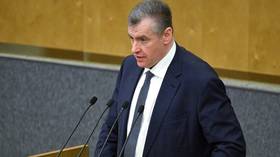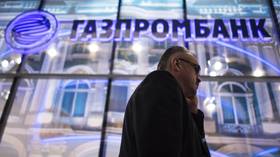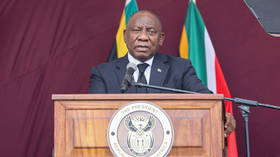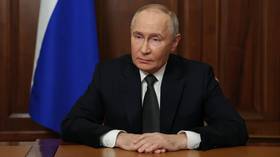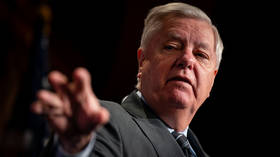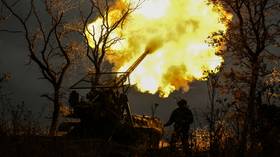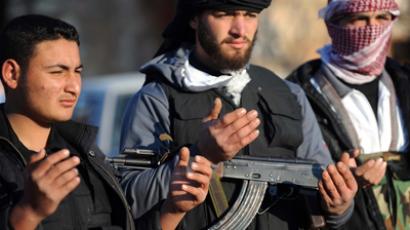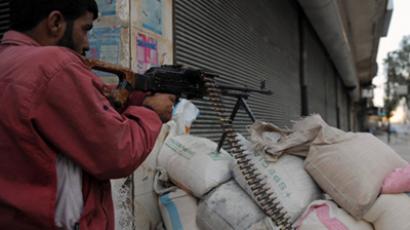Ceasefire only solution to Syrian crisis – opposition activist
The only path to peace in Syira is a ceasefire, yet a proxy war backed by outside groups is holding both the Syrian government and the opposition hostage, Syrian political activist Abdul-Aziz Al-Khair says.
Khair has been an opposition supporter for over a decade in a country that’s now torn by violence.Oksana Boyko: He was a critic of the Syrian authorities long before it was safe to do that, spending 14 years in prison for his political activism. Doctor Abdul-Aziz Al-Khair, a prominent member of Syria’s domestic position is joining us now on RT. Thank you very much for your time, sir. Abdul-Aziz Al-Khair: Thank you for receiving me. RT: Syrian opposition has so many faces at this moment: there are bearded men with Kalashnikovs, there are some people who are trying to direct the uprising from abroad. You represent grassrootopposition. Do you think that your longtime goals for this country, the future that you envisage, is actually being served by ongoing clashes?AK: Well, it’s really important, and a clever question, thank you for that. It’s not easy now to decide what we’ve struggled for a long time to achieve in Syria is within hand reach nowadays. Because too many complications happened in the uprising of Syria. The uprising started peacefully for democratic goals, freedom and dignity. But then there was a curve, because the regime decided to treat those wishing all by military means and thus forcing Syrians to hold arms, to defend themselves at the beginning. And then there was a chance – really an important chance for extremists and the opposition to enlarge their forces and to gain support from some regional states – and maybe global, as well, international, I mean. And that’s where the things started to get worse and worse. But we still stick to hope – because we have to, and we’re still fighting to gain a peaceful political process in order to preserve the Syrian people aims from the uprising.RT: Do you have any specific idea how you can start this political process – because everybody’s talking about the reconciliation – but nobody knows how to carry this out. AK: We’re trying to sort out any kind of understanding, any kind of agreement on the international scale to convince all the political parties involved, including the Americans, the Russians, the Chinese, the Europeans, Turkes, Iranians and Gulf States – that now it’s the situation that everybody is losing. And the result of the situation – if it goes on – will be a loose, loose situation. No one will benefit from that. That’s why everybody must cooperate to convince the military groups, first of all the regime, second – arm groups of the opposition. It’s high time, indeed, come to a ceasefire – and to start negotiations about what to do and how to arrange some peaceful future for the country. Of course, this includes the President and his family must step aside at least for a while. And power must be passed on to some acceptable person (from the regime), acceptable to the regime, and acceptable to the opposition as well to start a transitional period, in which some new constitution and some new legality will be established in the country.RT: If those transparent elections that you are envisaging, would result in the current President Assad getting the majority of votes – would that be acceptable to you and, I guess, most importantly – would that be acceptable to the world?AK: Once any person accepts the principles of voting and the voting is really legal and transparent, everyone must accept the results, the outcome of the elections. RT: You spent 14 years in prison and definitely you have an extra grind with the Assad’s family. Why are you not among those who are carrying arms at this point? Why are you not fighting him?AK: First of all, I’ve been studying and practicing politics for decades. And I came to the conclusion, which is the only logical conclusion, that arms will lead to the destruction of the country and not to democracy. It is a harmful way, it is useless and it will support the extremists on both sides. That is why from the very beginning it was very clear for me and for others that peaceful struggle is the only way towards a democratic future of the country. RT: You know, in Western eyes the home grown civil opposition and armed groups are perceived as allies. Given what you’ve just said why haven’t you or groups who support you been more vocal in trying to distance themselves from using terror for achieving political goals? AK: Among the armed opposition you have different political goals and different political attitudes. I believe many groups through the armed opposition declared they will be in favor of a political process on certain terms and conditions, while others would not respond to this. We have some Salafists, some Islamic extremists who have their own agendas. So, among the civil and peaceful opposition there are really connections with some armed opposition groups. And there is a common understanding among them not to harm the civilians and not to attack any infrastructure establishments. And it is only legal to use arms to defend lives and civilians. RT: From the very beginning you have been strongly against international intervention into Syrian affairs. And one can argue what we have now in Syria is a form of covert military intervention because you have flow of arms going through your borders. So, even you admit that there are some foreign nationals fighting the Syrian army in the north. What do you think is more damaging: the open “Libyan-style” military intervention or covert but still lasting intervention in the form of supplying arms?AK: The “Libyan style” is a completely imaginary if you try to apply it in Syria, it is impossible. All the circumstances are different – the Syrian, the regional and the international circumstances. What happened in Libyan cannot be repeated in Syria – that is number one. Number two – yes, day after day the struggle and the fight in Syria is becoming some kind of a proxy war. Day after day the regime and the armed groups in the opposition are becoming more and more hostages in the hands of their allies, they are losing their independent decision, they cannot apply what they think or believe in because they need support in arms, in ammunition, financial support, etc. RT: Freedom can mean very different things to many different people. And the footage that we often get from the north, of the fighters often shouting “Allah Akbar”, there also reports that they are fighting for the creation of the Islamic state and my question to you – is there any danger that in search for greater political freedoms Syria may lose other forms of freedom – for example, social, religious gender freedom and all those other aspects of dignity and freedom? AK: Simply, very frankly – yes, there is a possibility now and it was not created just now, it accumulated through days, that the Syrians may lose some of the freedoms that they are used to. It is a possibility. But there are other possibilities as well. That is why we say you cannot preserve you’re your right by just being afraid or wait. You must be active. We believe that the majority of Syrians will not choose any kind of religious state. RT: I sometimes get an impression that here in Syria the hatred for the opponent within some people is stronger than the love for their own country. And they would rather be right then merciful to people around them. In the current circumstances and given your experience, how can you foster the spirit of reconciliation given how far this situation has gone already? AK: Among some Syrians, not the majority of Syrians. Among the active Syrians now. The majority is not active yet. And I have a thought from time to time – what on earth is going on, how are we doing that. Yes, we are questioning ourselves. But I believe this is the reaction which will come to an end – sooner or later. Because it is not the real culture or the real soul of the Syrian history of the Syrian people.



